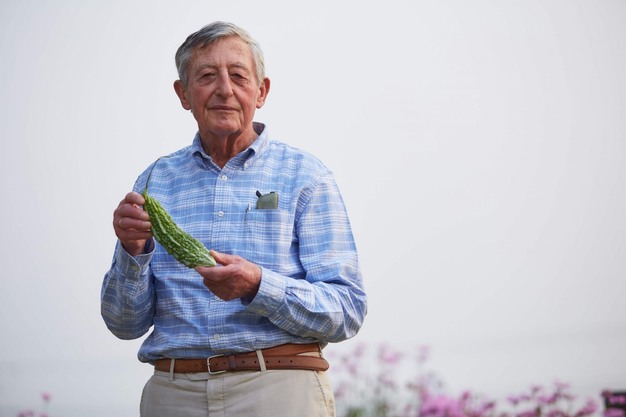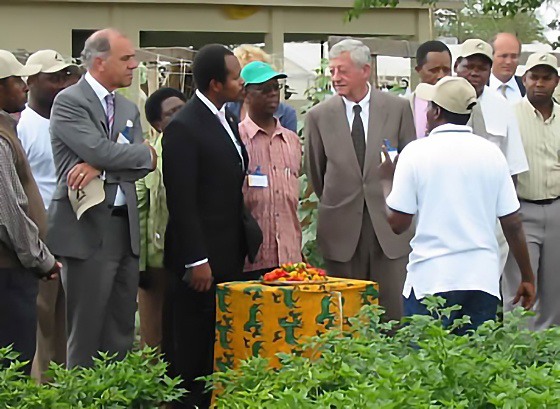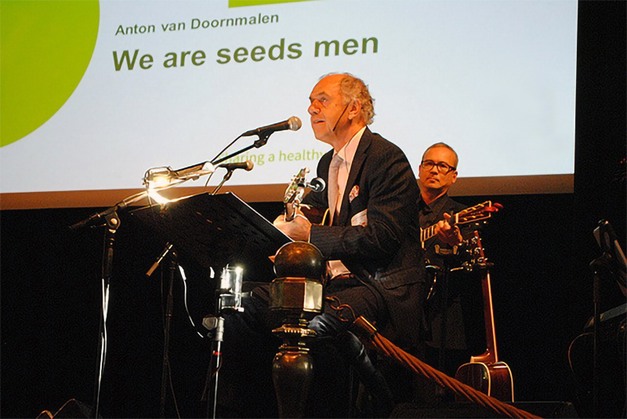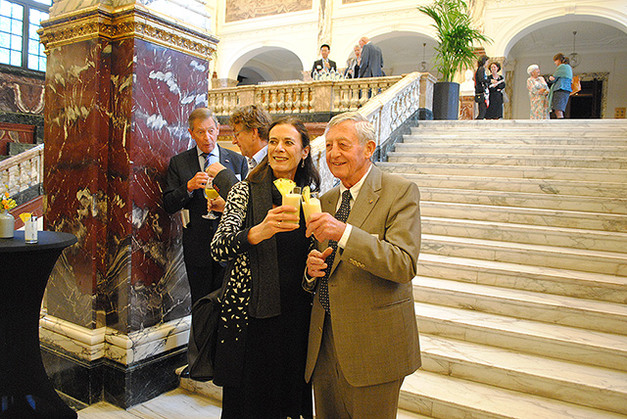Messages have been pouring into the online memorial page following the announcement of Simon Groot's passing yesterday. Although the founder of East-West Seed passed away at a venerable age, his absence leaves a profound void. At the same time, those who knew him say he did everything in his power to secure his legacy and vision. That was his mission: to ensure that quality seeds are accessible to farmers around the world. Industry figures like Anton van Doornmalen, Louise Fresco, Rob Baan, and Niels Louwaars share what Simon Groot and East-West Seed meant to the horticultural sector—and the world.
 © East West Seeds
© East West Seeds
Seedsman
A seedsman. That simple term encapsulated everything Simon stood for: his work, his passion, his convictions, and his sense of responsibility. "Nothing more and nothing less. And for Simon, that was everything," recalls Anton van Doornmalen, former director of Rijk Zwaan.
It's almost hard to imagine, but the now globally influential Dutch seed sector might never have reached this point without a primary school in Enkhuizen, a town in the North of the country. In the 1930s, both Simon Groot and Maarten Zwaan—later director of Rijk Zwaan—sat in those classrooms. Anton, who led Rijk Zwaan alongside Maarten for many years, knew Simon before he truly knew him. "Sure, we were competitors, but more than that, we were colleagues—friendly rivals. And very much friends too," he shares. Over the decades, countless conversations followed—on breeding, the world, and adding value through seeds.
After the family business Sluis & Groot was sold, Simon founded East-West Seed in 1982. During a visit to Bangkok, Anton and Maarten saw Simon's passion up close. "That's when the real significance of our sector for smallholder farmers became undeniably clear." This shared mission—to deliver better seed to farmers—united their companies.
"Seeds are the foundation of food security. With relatively small investments, you can create massive value by developing better varieties and providing access to technology for smallholder farmers. You elevate local vegetable production and make a tangible difference. That's always been Simon's core message: this is where the food chain begins. We have a responsibility—and the tools—to do something about it. And Simon did, in every possible way."
Fuelled by Simon's conviction, Rijk Zwaan also initiated activities in Africa, leading to the joint founding of Afrisem, to make quality seeds available to African farmers.
 © Rijk Zwaan
© Rijk Zwaan
The opening of Afrisem in 2008. From left to right in a suit: Anton van Doornmalen, co-owner and chairman of the advisory board of Rijk Zwaan, Dr. David Mathayoen, Tanzanian Secretary of Agriculture, and Simon Groot, founder and chairman of the board of East-West Seed.
Sense of responsibility
Simon's sense of duty toward East-West Seed didn't fade with age—quite the opposite. Anton recalls many conversations about the importance of family-run breeding companies and the challenge of planning succession. "How can I ensure that what we've built will carry on?" Simon wasn't fixated on his own children taking over—who initially pursued careers outside the company—but on preserving the company's mission for the farmers who rely on East-West seeds.
"In breeding—especially in the regions where East-West operates—you invest for the long term. You won't see a quick return. Developing varieties for smallholders is part business, part development aid. It takes patience and vision. But that's where a family business can make a lasting impact. That's what Simon wanted to protect."
Many of these conversations took place in Africa. When Simon celebrated his 75th birthday at Afrisem, Anton sang a tribute to the breeding sector and their role in it.
We are just seedsmen, and our story is seldom told. We have to leave our homes and our families when we want to do our job. Looking out for the best area where quality seed can be sown. It's in the interest of us all, to add value and improve performance. This unique combination of high-tech and human sense is the best way for growth and future plans.
Five years later, during Simon's 80th birthday symposium at the Tropeninstituut, Anton sang an adapted version of a John Denver melody.
Perhaps East West is more than a place to work. A shelter from the storm. It exists to give you comfort. To develop, to perform. And after times of traveling, when you make your company known with lots of memories and good plans, you're coming home.
Perhaps East-West is like the ocean. Full of challenge, full of change. Like a fire when it's cold outside, or a seedling when it rains. Create and build together, and make your dreams come true. Lots of chances in East-West are there for you.
"These are the moments I carry with me," says Anton. "You're with a competitor, yes, but also a friend. That passion and purpose—that's what makes it all so special."
 © Rijk Zwaan Photo of Simon Groot's 80th birthday
© Rijk Zwaan Photo of Simon Groot's 80th birthday
Vision on horticulture still relevant
"Let me be brief," says Louise Fresco, scientist, writer, and former president of Wageningen UR. "Simon Groot made an extraordinary contribution to tropical vegetable breeding. He saw—far ahead of others—the role of vegetables in nutrition, public health, and women's income. He remained deeply engaged to the very end, a true inspiration to many."
At his 80th birthday symposium, Fresco emphasized the vital role of horticulture in countries like Myanmar and called agriculture "a matter of life and death." She adds, "Simon leaves behind not only an incredible company but a vision for tropical horticulture that's as relevant today as it was at the beginning. I hope that the lessons he learned in Asia will spread further into Africa."
Louise Fresco together with Simon Groot
The potential of horticulture
"What's unique about the breeding industry is the enormous potential to improve horticulture for millions of growers. A grower's worst enemy? Poor-quality seed," says Rob Baan from Koppert Cress.
Though born into a seed family, Simon initially took a different path, studying economics in Rotterdam under Nobel laureate Jan Tinbergen. "It wasn't until later that he realized the value of the seed trade his family had built. When Sluis & Groot was sold to Sandoz—too soon, in his view—Simon used his shares to start something new: a seed company for the small grower, far from the reach of multinationals. That became East-West Seed."
"These small farmers were being misled by beautiful seed packets with glossy photos and bad genetics inside. You only realize you've been tricked after the crop is in the ground—when it's sick, unsellable. Simon kept it simple in the beginning: select the best plants, clean and purify the seed, and refine the variety year after year. Don't price it too high. Make it accessible. That's what he did for countless crops across Asia. And now they're doing the same in Africa and Latin America."
Rob recalls a Christmas card from Simon showing an African woman with a huge pile of pumpkins worth €3,000—grown from €5 worth of seed. "Simon was too modest to boast, but there's a lesson there for every NGO: give someone quality seeds and knowledge, and you don't just feed them—you create entrepreneurs."
Together with Simon, Rob also helped revive the school garden movement in the Netherlands. "It's just as bad to give kids the wrong seeds as it is for farmers. Even worse if they have no school garden at all." With the help of volunteers like Lianne van der Kruk and support from policymakers like Carola Schouten, school gardens are thriving again. "In our last talk a few weeks ago, Simon emphasized—this must continue."
East-West's tropical seeds may not suit Dutch school gardens, "but he encouraged other seed companies to donate their best varieties. Not for himself—for the future of horticulture, vegetable consumption, and a love for the craft. Fortunately, his seeds do very well in Suriname, where we also have a school garden project. Nobody knows Simon Groot there, but all the schoolchildren now know East West Seeds."
"I'll miss our conversations," Rob adds. "We could sit in his living room and reflect on global issues as if they were happening next door. 'Did you read that article? What were the trial results? What are they growing in the school gardens now?'"
"We sowed good seeds. And there will be a good harvest. But it won't be easy to carry on his legacy."
A stubborn visionary who gave millions of farmers a better life
Niels Louwaars, who stepped down in October as director of the Dutch seed association Plantum, had known Simon for decades, since his graduation from Wageningen University. Their paths crossed frequently, often in the tropics where Niels worked on seed projects. Simon's passing affects him deeply, not only personally but because of the massive global impact Simon had on the vegetable seed industry and the farmers it serves.
"His impact is undeniable. East-West Seed was revolutionary in its own right. He wasn't focused on rice or maize—he was working on long beans and bitter gourd, crops many in Europe had never heard of," Niels says. "And he wasn't targeting large-scale operations, but farmers with barely half a hectare. He recognized early on that they were the key to global food security."
Simon's approach wasn't just about selling better seeds—it was about education. "Without knowledge, even the best genetics won't make a difference. He invested massively in farmer training. That's what made East-West Seed unique."
Feeding millions
"You can say without exaggeration that Simon structurally improved the lives of millions of farmers," Niels concludes. "And by doing so, enhanced the diets of tens of millions more." His work started in the Philippines but expanded to Indonesia, Thailand, Africa, and Latin America. In 2019, he was awarded the World Food Prize—a recognition usually reserved for staples like rice or wheat, but now for the first time awarded to a pioneer in vegetable seeds.
"As director of Plantum, that moment made me proud: real recognition for nutrition, not just calories."
Stubborn with a mission
Simon was, in Niels' words, a "stubborn Dutchman—in the best possible sense." Visionary, determined, and always constructive. "His conversations were about seeds, about people, about countries.
His persistence also came through in his attitude toward family succession. "Initially, he didn't want his children in the company at all. He wasn't focused on creating a dynasty. He always said: 'The company is my hobby, choose what you want to do.'"
Only after they found their own path did they become involved with East-West Seed. "His children came back on their own terms, and never based on their last name."
Dutch roots
Though East-West Seed is headquartered in Thailand, its Dutch roots remain strong. "The Dutch plant breeding cluster is truly unique. That's why Simon remained actively engaged with Plantum, even if his business operations in the Netherlands were limited. He believed that collaboration made us stronger—even among competitors."
Simon also understood the critical role of good governance in family-run companies. "We had many open discussions about safeguarding vision and preventing mission drift after leadership changes. It's a conversation many in the sector are still grappling with."
Simon Groot passed away on July 6, but his legacy is secure. He remained active to the end, brimming with plans and passion. "His vision doesn't rely on family name alone—it's embedded in East-West's DNA."

